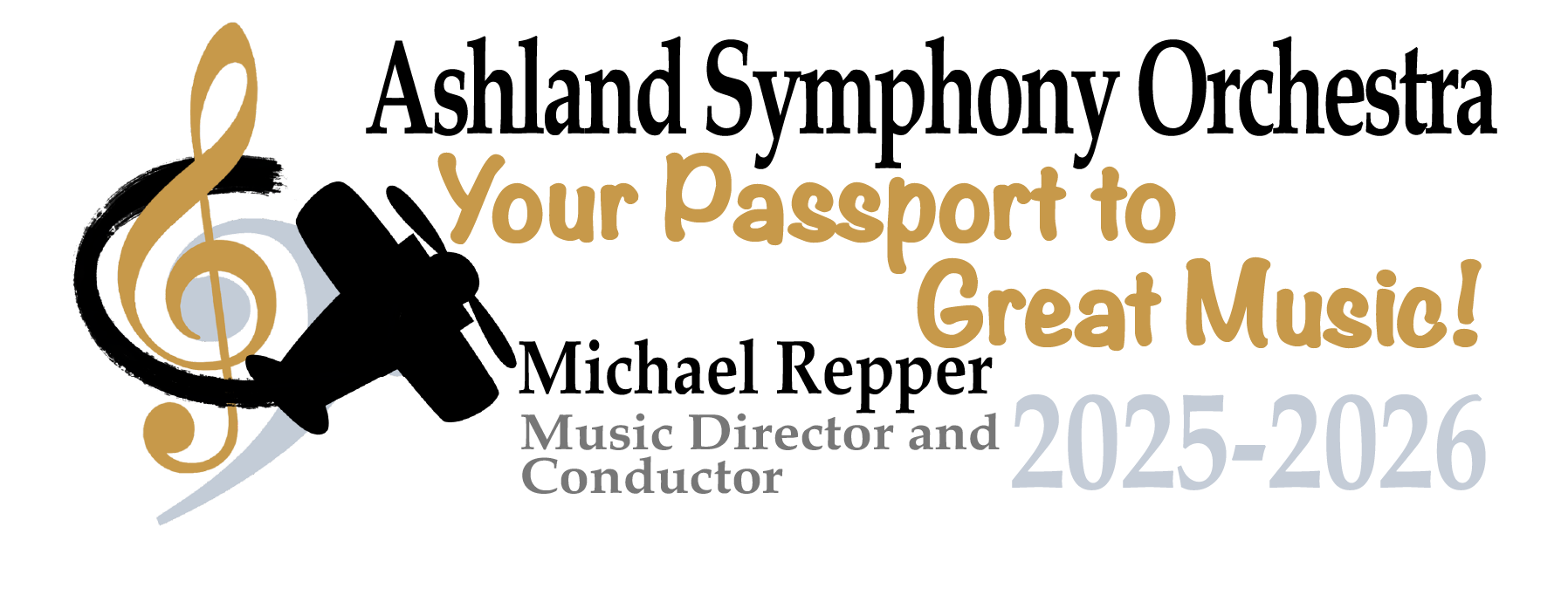5 Negro Melodies – Samuel Coleridge-Taylor
Toussaint L’Ouverture, op.46 – Samuel Coleridge-Taylor
Concerto Violoncello, op.104, B.191 B minor – Antonín Dvořák with Amit Peled, cello
6:50 p.m. Preconcert talk, Archer Auditorium
5 Negro Melodies – Samuel Coleridge-Taylor
Toussaint L’Ouverture, op.46 – Samuel Coleridge-Taylor
Concerto Violoncello, op.104, B.191 B minor – Antonín Dvořák with Amit Peled, cello
6:50 p.m. Preconcert talk, Archer Auditorium
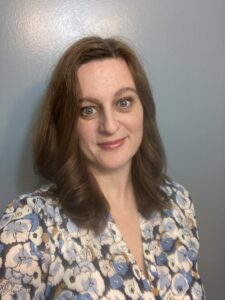
On behalf of the Board of Directors of the Ashland Symphony Orchestra, welcome to our 56th season! I feel such warmth and pride that our small town supports a professional symphony orchestra. The ASO is truly a gem of our community, sharing the joy of orchestral music with people of all ages and backgrounds. Our Grammy-award winning Music Director and Conductor Michael Repper and the talented professional musicians of the ASO have created another incredible season for your enjoyment. We are eager for you to hear the beautiful, powerful, soul-filling music that they have prepared for you. Meanwhile, our Executive Director Martha Buckner continues to provide innovative opportunities, such as the ASO Fan Club, that support the development of young musicians throughout Ashland County and beyond. I am deeply thankful to our musicians, staff, board members, and supporters for making this season possible. And to our patrons, please know that your presence at ASO performances means so much! Whether you are joining us for a pops concert, a concert in our Saturday night subscription series, or one of our concerts presented especially for young people, your attendance lifts up the ASO. Thank you for choosing to spend your time with us!
Diane Bonfiglio, Ph.D.
President, ASO Board of Directors
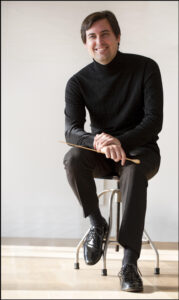
Dear Friends,
Welcome to the Ashland Symphony Orchestra’s 2025–2026 season! It is a joy and an honor to continue this musical journey with you as your Music Director.
This year, we invite you to come aboard for a season of imagination, discovery, and connection—a musical journey that takes flight and carries us to every corner of the world. Like a great plane ride full of wonder and anticipation, each concert is a stop on a global adventure. You’ll hear the brilliance of Beethoven, the soul of Coleridge-Taylor, the energy of Jessie Montgomery, the lyricism of Schubert, the fervor of Borodin, and so much more. These works, drawn from across time and cultures, remind us that music is a language that speaks to the heart.
One of the highlights of our season is a groundbreaking spring concert that reflects our deep commitment to community and innovation. In partnership with Goldberry’s Coffee, we’ll combine music with global storytelling and curated coffee tastings—an immersive, sensory celebration that brings people together in a truly unique way. This collaboration is one of many ways we continue to grow as a vibrant cultural hub in Ashland and beyond.
Whether you’ve been with us for years or are joining us for the first time, your presence is what gives our music life. Thank you for supporting live orchestral music and for being a vital part of our ASO family.
I look forward to sharing the season with you—and to welcoming you on this musical adventure.
With warmest regards,
Michael Repper
Music Director
Ashland Symphony Orchestra
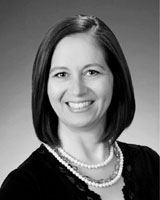
Executive Director’s Message
I am thrilled to have you join us on our ‘round the world tour of classical music! From the old masters to the new trailblazing composers, the musicians of the ASO will bring the pieces to life.
Hanna Strickland, ASO Administrative Assistant, and I had great fun creating the theme of “Your Passport to Great Music” and naming the concerts, and we hope you enjoy the journey.
The $100,000 challenge set forth by Bob and Jan Archer was met and they have established a new $1 million endowment to benefit the ASO. My challenge to you is to invite friends and family to each of the concerts this season.
Sit back, relax, and enjoy the flight!
Martha Buckner, Executive Director
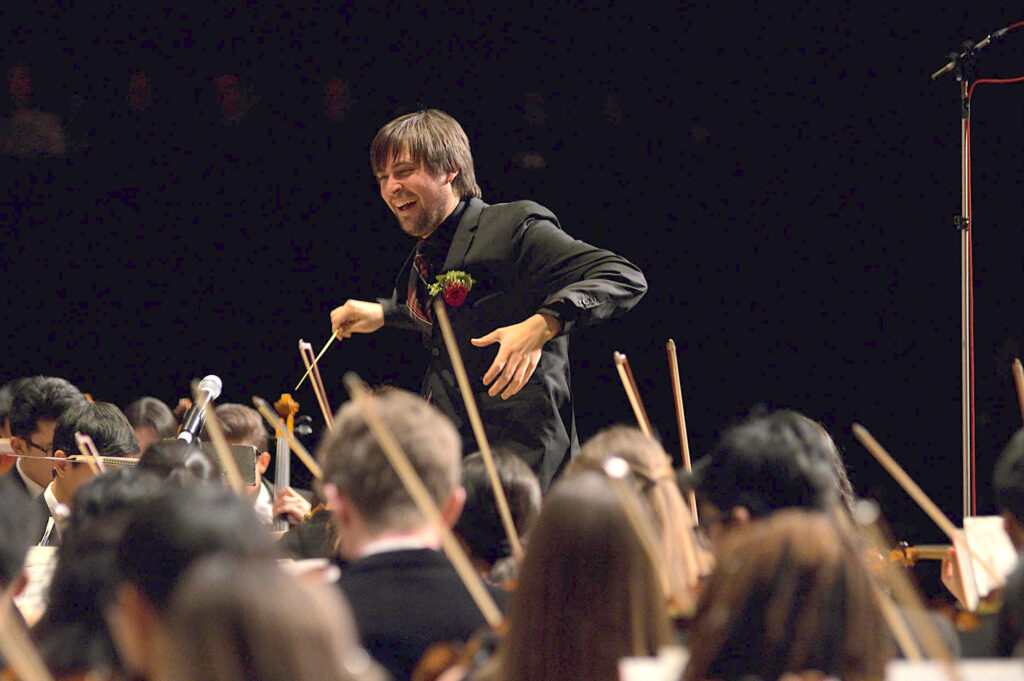 Conductor Michael Repper’s work spans six continents. In 2023, he became the youngest North American conductor to win a Grammy® Award in Best Orchestral Performance. He has an international reputation for engaging and exciting audiences of all spectrums, and for promoting new and diverse musical talents.
Conductor Michael Repper’s work spans six continents. In 2023, he became the youngest North American conductor to win a Grammy® Award in Best Orchestral Performance. He has an international reputation for engaging and exciting audiences of all spectrums, and for promoting new and diverse musical talents.
Repper is currently the Music Director of the Ashland Symphony Orchestra, Mid-Atlantic Symphony Orchestra, and the Northern Neck Orchestra of Virginia. He recently concluded tenures as Music Director of the New York Youth Symphony at Carnegie Hall, and as Principal Conductor of Sinfonía por el Perú, the elite youth orchestras and choruses of one of South America’s most versatile social impact music programs. Repper was the Baltimore Symphony Orchestra Conducting Fellow for two seasons, and he served as the BSO’s New Music Consultant. Recognizing his success at these ensembles, and his growing profile as a guest conductor all over the world, Repper was awarded a Solti Foundation US Career Assistance Award in 2020, 2021, 2022, and 2023.
His album with the New York Youth Symphony, which features debut recordings of works by Florence Price, Jessie Montgomery, and Valerie Coleman, achieved widespread critical acclaim, reached #1 on the Billboard Chart, and won a Grammy® Award, marking the first time a youth orchestra achieved this milestone.
Repper has collaborated on large-scale productions of symphonic and theatrical works with the Weill Music Institute at Carnegie Hall, the Chicago Symphony Orchestra, Ravinia Festival, Peabody Institute of Music, and the New School of Music, among others. An avid pianist, he regularly performs as a soloist alongside his orchestras.
Alongside the standard repertoire, Repper is especially invested in programming new music and showcasing fresh talent. His ensembles have performed dozens of world premieres and pursued innovative commissions, as well as a variety of Carnegie Hall premieres from established and emerging composers.
His experience with choruses has been recognized with significant positions, including his tenure as the Music Director at the Baltimore Basilica, the first Catholic Cathedral in the United States. Internationally, Repper has performed with highly regarded ensembles and in the world’s greatest venues, including the São Paulo Symphony, and at the Palau de la Musica in Barcelona, Carnegie Hall, and others.
His discography includes the aforementioned album of music with the New York Youth Symphony, alongside an album with the Grammy®-Nominated Metropolis Ensemble and Grammy®-Winning Brooklyn Youth Chorus (“Musical America”), and several with the Peabody Institute as an Assistant Conductor. With the New York Youth Symphony during the Coronavirus pandemic, he was one of the first to pioneer the practice of distanced orchestral performance videos, and he made two performance appearances on CNN, the final one with Platinum-Artist Billy Ray Cyrus.
Repper complements his work with professional orchestras with a firm commitment to education, and travels worldwide to work with ensembles of young musicians. As Artistic Director of the Chamber Music Society of Maryland, he ushered in a slate of innovative educational programming, such as the Reinecke Youth Chamber Music Scholarship and Fellowship Program. He has conducted several masterclasses for orchestras from all over the United States on behalf of the New York Philharmonic, and conducts side-by-side and educational concerts with major orchestras, including the Baltimore Symphony, the Colorado Symphony, and the Sarasota Orchestra.
Repper’s most influential conducting mentors are Marin Alsop and the late Gustav Meier. He believes that a conductor’s main role is to connect people and to use performance as a vehicle for positive change. He aims to promote a diverse and inclusive future for the arts, and to pay forward the passion for community that his mentors demonstrated to him.
COLERIDGE-TAYLOR, Samuel: Toussaint L’Ouverture Overture for Full Orchestra
Instrumentation: flutes, piccolo, oboes, clarinets, bassoons, horns, trumpets, trombones, tuba, timpani, percussion, harp, strings
Duration: 17 minutes
Samuel Coleridge-Taylor was born on 15 August 1875 in Holborn, central London. His mother, Alice Hare Martin, and father, Dr. Daniel Hughes Taylor, were not married. Indeed, Dr. Taylor had returned to his home country of Sierra Leone before it was discovered that Alice was pregnant. When Samuel was about five years old, Alice’s father gave him a quarter-size violin, an instrument for which, it turned out, the little boy had a startling natural aptitude.
With the mentorship of local violinist Joseph Beckwith, and later with the support of Colonel Herbert Walters, Coleridge-Taylor’s talent developed rapidly. Walters sponsored his entry to the Royal College of Music in 1890 as a violin student of Henry Holmes. His abilities were not restricted to playing the violin: his interest in composition was developing. In 1891 he wrote an anthem, In Thee, O Lord, which was immediately published by Novello. At the suggestion of Walters, it was arranged that Coleridge-Taylor
would study composition seriously under Charles Villiers Stanford; he quickly won the first in a succession of composition scholarships.
From 1896, the awakening of Coleridge-Taylor to his African heritage made an increasing impact on his music. He had been deeply moved by the spirituals of the African American ‘Fisk Jubilee Singers,’ an a cappella ensemble from Fisk University in Nashville, Tennessee, whose manager, Frederick J. Loudin, had a similar choir in Britain. Notwithstanding the duality of his racial heritage, Coleridge-Taylor regarded himself unequivocally as a Black man.
Coleridge-Taylor was the youngest attendee at the first Pan-African Congress, held in London in July 1900. It may be no coincidence that the concert overture Toussaint L’Ouverture appeared in 1901. Former slave and a self-proclaimed Creole, Toussaint L’Ouverture was a Haitian general and the most prominent leader of the Haitian Revolution, the only successful revolt by slaves in modern history. In 1802, Toussaint L‘Ouverture and a hundred members of his inner circle were captured and deported to France, where he died in prison in 1803. In common with most of Coleridge-Taylor’s single-movement orchestral works, this tribute (labelled ‘Concert Overture’ by its composer but, in reality, more of a tone poem) is in a loose sonata form. But, it has a number of developmental episodes somewhat in the manner of the later symphonic poems of Antonín Dvořák, one of Coleridge-Taylor’s favourite composers. The harmonic structure is adventurous and the scoring luxuriant, and the piece has a refulgent climax of considerable power. — Lionel Harrison
–Wm. E. Runyan
© 2015 William E. Runyan
COLERIDGE-TAYLOR, Samuel: Suite from “24 Negro Melodies”
Instrumentation: flutes, piccolo, oboes, clarinets, bassoons, horns, trumpets, trombones, tuba, timpani, percussion, strings
Duration: 25 minutes
In the course of his visit to the USA, William Arms Fisher, representing publishers Oliver Ditson Co. of Boston, asked Coleridge-Taylor whether he would accept a commission to arrange an album of ‘Negro folk songs’ for solo piano. Fisher had been a student of Antonín Dvořák when he was the Director of the National Conservatory of Music in New York City
between 1892 and 1895. Accordingly, Coleridge-Taylor produced a set of 24 Negro Melodies which were published in 1905 as his opus 59.
He drew on two principal sources: the ‘Jubilee Songs’ of the Fisk Jubilee Singers, which had been collected by Theodore Seward, the founder of the Brotherhood of Christian Unity, first published in 1872, and a collection of folk-songs and tales from south-east Africa published in 1897 by Henri Junod, the Swiss Protestant missionary. In his foreword to the first edition, Coleridge-Taylor wrote, ‘What Brahms has done for the Hungarian folk-music, Dvořák for the Bohemian and Grieg for the Norwegian, I have tried to do for these Negro Melodies. The plan adopted has been almost without exception that of the Tema con Variazioni’.
Coleridge-Taylor made further arrangements for piano trio of five of the Negro Melodies which Ditson also published, along with a transcription for violin and piano of Deep River by Maud Powell, the American violinist for whom Coleridge-Taylor was to compose his Violin Concerto. A further reinterpretation of Deep River by Curtis Stewart is included on the CD highlighted on the previous page, alongside his versions of They Will Not Lend Me a Child (coincidentally, also the fourth movement of this suite) and The Angels Changed My Name. Coleridge-Taylor also transcribed for full orchestra the Suite from ‘24 Negro Melodies’ recorded here but these remained unperformed during Coleridge-Taylor’s life. Patrick Meadows discovered the manuscripts of these five transcriptions in the British Library, which holds some fair copies and some rougher sketches in the composer’s hand, as well as a couple of copyist’s ‘tidied-up’ versions.
In 2012, Patrick and I prepared the first edition of these orchestral versions of the Five Negro Melodies from those manuscripts. Rather more editorial intervention than usual was required because of the sketchy nature of some of them, not least some missing woodwind and brass parts from I’m Troubled in Mind that I had to devise (using the piano original as an aide) in order to render the piece playable.
Although they appear in a sequence different from that in which they occur in the piano version, Coleridge-Taylor’s numbering of them in his manuscripts makes it clear that they were intended to form a suite in the order presented here. The transcriptions follow the piano originals very closely in terms of structure (if not in key, harmony or decorative passagework). However, at the end of the Finale, Oloba, Coleridge-Taylor includes a quotation from the first, I’m Troubled in Mind, as a final peroration that provides cohesion to the work as a suite, rather than just a random collection of songs. — Lionel Harrison
[The following text is a repetition of the intro to the program notes for Toussaint L’Ouverture. Rather than lead with it, I have included it here. — MB]
SAMUEL COLERIDGE-TAYLOR was born on 15 August 1875 in Holborn, central London. His mother, Alice Hare Martin, and father, Dr. Daniel Hughes Taylor, were not married. Indeed, Dr. Taylor had returned to his home country of Sierra Leone before it was discovered that Alice was pregnant. When Samuel was about five years old, Alice’s father gave him a quarter-size violin, an instrument for which, it turned out, the little boy had a startling natural aptitude.
With the mentorship of local violinist Joseph Beckwith, and later with the support of Colonel Herbert Walters, Coleridge-Taylor’s talent developed rapidly. Walters sponsored his entry to the Royal College of Music in 1890 as a violin student of Henry Holmes. His abilities were not restricted to playing the violin: his interest in composition was developing. In 1891 he wrote an anthem, In Thee, O Lord, which was immediately published by Novello. At the suggestion of Walters, it was arranged that Coleridge-Taylor
would study composition seriously under Charles Villiers Stanford; he quickly won the first in a succession of composition scholarships.
From 1896, the awakening of Coleridge-Taylor to his African heritage made an increasing impact on his music. He had been deeply moved by the spirituals of the African American ‘Fisk Jubilee Singers,’ an a cappella ensemble from Fisk University in Nashville, Tennessee, whose manager, Frederick J. Loudin, had a similar choir in Britain. Notwithstanding the duality of his racial heritage, Coleridge-Taylor regarded himself unequivocally as a Black man.
–Wm. E. Runyan
© 2015 William E. Runyan
DVOŘÁK, Antonín: Concerto, Violoncello, op.104, B.191, B minor
III. Finale: Allegro Moderato
Instrumentation: flutes, piccolo, oboes, clarinets, bassoons, horns, trumpets, trombones, tuba, timpani, percussion, strings
Duration: 40’
Completed in 1895, Dvořák’s cello concerto (actually his second for that instrument, but the first is an early work not nearly as popular as the second) was the last concerto that he composed. The concerto was not one of his favorite genres, notwithstanding his own ability as a public performer. The Violin Concerto in A Minor and this cello concerto are concert favorites these days, but the few other concertos—or concerto-like—compositions play a minor rôle in his oeuvre. This is somewhat surprising, considering that Dvořák was a prolific composer, who much more than most other important composers, made significant contributions to almost every musical genre.
It would be a mistake to consign him primarily to the category of “nationalist” composers, an important conceptual tool in understanding the nature of nineteenth-century European art music. To be sure, he clearly thought of himself as a champion of Czech music, and he incorporated significant Czech musical, literary, and historical elements into his works. His Slavonic Rhapsodies, tone poems, operas, and songs—the list goes on and on—all are heavily infused with Czech melodies, linguistic inflections and characteristic rhythms, and national legends and stories. And it must be admitted, these essential elements of his artistic voice are near the core of his attractiveness to audiences worldwide—not just in his homeland. Yet, to focus inordinately on these elements would miss the mark in understanding the most important aspect of the nature of his music.
In short, Dvořák was a clear adherent of the artistic thinking of those composers of the nineteenth century who saw a fecund outlook for the tradition of Mozart, Haydn, and Beethoven (and later, Mendelssohn) in the fundamental way of composing. That is, an approach that emphasized classical forms and designs, integrated development of musical ideas, and in general, a restrained and balanced expression that placed strong emphasis on music as an abstract art. Wagner, Lizst, and others embraced an exuberant style that emphasized exaggerated emotions, new forms, asymmetries, and motivic fragmentation. Not so for Brahms, Dvořák, and other musical conservatives. They stuck to modern reinterpretations of doing things the old-fashioned ways, and in doing so, created marvelous works that stand equally the test of time with the works of the darlings of those who posit, “Change is good.”
As most folks know, Dvořák spent most of the years from 1892 to 1895 in the United States, during which time several important works were composed, including his “New World” Symphony and the Cello Concerto in B Minor. Notwithstanding the conditions of its creation, there is nothing of the “new world” in this piece. It was composed for a friend, the important Czech cellist, Hanuš Wihan, who gave Dvořák pointers during its final preparation. One will hear the traditional three movements of a concerto, including a long orchestral exposition before the soloist enters. Of interest in the elegiac second movement is a quotation of a song by Dvořák that references his sister-in-law who was ill at the time, and soon passed away. He went on to insert the tune in the final movement, as well. In the last movement the tune is played by a solo violin. This marvelous concerto well deserved its popularity and reputation over the years, for it is a nigh perfect example of Dvořák’s ability to meld virtuosic challenges to the soloist (and you will be well able to spot them), his solid mastery of orchestral construction—like his champion, Brahms–and his innate melodic gifts. As one wag once said: [he seemed to just] “pull melodies out of his sleeve.”
–Wm. E. Runyan
© 2015 William E. Runyan
Amit Peled
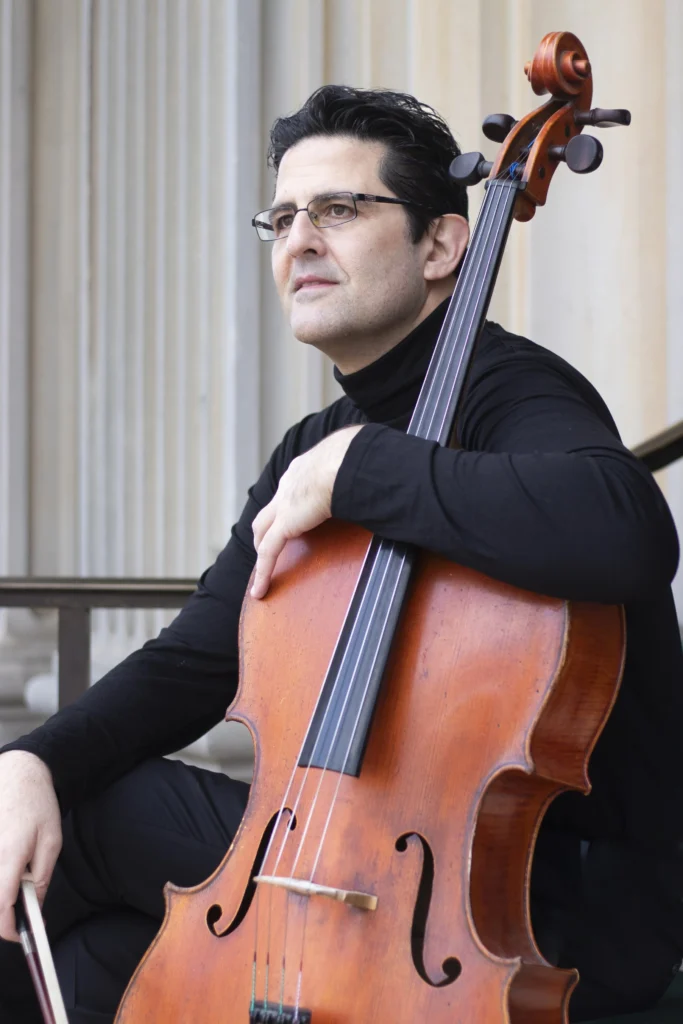 Internationally acclaimed cellist, conductor, and pedagogue Amit Peled is recognized as one of today’s most exciting and virtuosic performers. He has performed on many of the world’s most prestigious concert halls, including Carnegie Hall and Alice Tully Hall in New York, the John F. Kennedy Center for the Performing Arts in Washington, D.C., Salle Gaveau in Paris, Wigmore Hall in London, Seoul Arts Center in Korea, and the Konzerthaus in Berlin, Germany.
Internationally acclaimed cellist, conductor, and pedagogue Amit Peled is recognized as one of today’s most exciting and virtuosic performers. He has performed on many of the world’s most prestigious concert halls, including Carnegie Hall and Alice Tully Hall in New York, the John F. Kennedy Center for the Performing Arts in Washington, D.C., Salle Gaveau in Paris, Wigmore Hall in London, Seoul Arts Center in Korea, and the Konzerthaus in Berlin, Germany.
Peled’s extensive discography includes more than twenty CD recordings, among them all the Bach suites using the legendary cello of Pablo Casals, on the Naxos, Centaur, Delos, and CTM Classics labels. A distinguished professor of cello at the Peabody Institute of the Johns Hopkins University in Baltimore, Maryland, he has also presented master classes and cello workshops all across the globe.
As an advocate of music of our days Mr. Peled has commissioned and premiered many works of living composers and will premier a cello concerto by his former student and Grammy Nominee Andrea Casarrubios in the 2026/27 season.
Named one of Musical America “30 Professionals of the Year” in 2015, Peled is the Founder and Artistic Director of the revolutionary Mount Vernon Virtuosi an orchestra based in his hometown of Baltimore. Under his leadership, the ensemble has transformed Maryland’s classical music landscape through free concerts and educational initiatives serving underprivileged communities. As a centerpiece of his community engagement, Peled established the Music House in East Baltimore, where young musicians live free of charge and actively connect with the neighborhood through outreach and performance.
A former Music Director of CityMusic Cleveland Peled continues to build an international reputation as a conductor alongside his vibrant career as a cello soloist.
Amit Peled is represented worldwide by @ctm_classics
Samuel Rotberg, Concertmaster
James E. Thomas Endowed Chair
Jane Reed
Kia-Hui Tan
Aiden Nease
Mary Ann Basinger
Colin Henley
Claire Laux
Jocelyn Taylor
Mary Kettering, Principal
Ania Kolodey
Michael Sieberg
Ruoyao Li
Joshua Chan
Frances Hamiltion
Eva Mondragón, Principal
Joshua Bowman
Jamie Thornburg
Lee Wilkinson
Jerry Miskell
Geoffrey Fischer
David Ellis, Principal
Matthew Rhee
Aidan Sullivan
Rosa Balderrama
Jacqueline Kaminski
David Londoño
Bryan Thomas, Principal
Moses Carreker
Jeff Weeks
Erin Torres, Principal
Denise Rotavera-Krain
Mary Longsdorf, Piccolo
Andria Hoy, Principal
Stefanie Minter
Thomas Reed, Principal
Gail Zugger
Ian Hoy, Principal
Zachary Elmore
Laura Makara, Principal
Michael Metcalf, Assistant Principal
Timothy Stewart
Benjamin Hottensmith
Jason Riberdy
Kenneth Holzworth, Principal
Ted Clark
Michael Grady, Principal
Justin Foelker
Charles Bradley II
Charles Kobb, Principal
Kirk Georgia, Principal
Torrell Moss, Principal
Lawrence & Catherine Hiner Endowed Chair
Hunter Wirt
Rebekah Hou, Principal
Our ushers and volunteers
Ashland High School staff for technical support
Ashland City Schools for its continued support of the Arts
Roger Price, Professional Voice Actor & Announcer https://rogerzvoice.com/
Hanna Strickland, Administrative Assistant
Seth Morrison, Stage Manager
Bryce Bishop, Assistant Stage Manager
Jen Burford, House Manager
Please silence all electronic devices.
No flash photography or audio/visual recording permitted.
No food or drink permitted in the Robert M. & Janet L. Archer Auditorium.
The individuals and associations listed on this page, by their support of the orchestra’s operating fund, make possible the continuance of the Ashland Symphony Orchestra. Additional support is needed and will be most welcome at any time throughout the year. If there is an error, please notify the office. Donations listed as of 09/04/2025.
Celebrate A Birthday! Welcome A New Neighbor! Honor A Memory! Celebrate A Promotion!
The Ashland Symphony will recognize the people or events in your life with a letter that you have donated in their honor to the Ashland Symphony Orchestra. Please send us that person’s name, address and the event along with your donation and we will send a personalized note acknowledging your thoughtfulness along with the printed celebration text in the upcoming program. Call 419-289-5115 for more information.
‡Sponsor – sponsorships are still available for this season. Call 419-289-5115.
*Additional gift given to the Change for Music Education Campaign
Pacesetters – patrons who pledged on or before July 31, 2023 are indicated in bold.
Name in italics – increased pledge by at least 10%
NAME IN ALL CAPS – increased pledge to move up to a new giving level
Robert M. and Janet L. Archer‡
Ashland County Community Foundation
Ashland University, in-kind support
ASO Podium Endowment Fund in Honor of Maestro Arie Lipsky est. 2018
The Dean and Joan Bartosic Fund (ACCF)
STAN AND DIANA BRECHBUHLER
Jim and Barb Chandler‡
Hugo H. and Mabel B. Young Foundation
Vicky Lippert
Loudonville Theatre and Arts Committee
Ohio Arts Council
The Elizabeth Pastor Fund (ACCF)
Samaritan Hospital Foundation‡
CHARLES AND PEGGY ULRICH
Anonymous
The John R. Donelson Fund (ACCF)
GRANDPA’S CHEESEBARN & SWEETIES CHOCOLATES‡
MICHAEL AND SEIKO HUPFER
Susan Lime
SUELLEN McBURNEY
ALAN AND MARJORIE POORMAN
Trinity Lutheran Church – Rybolt Fund‡
Dr. JoAnn Ford Watson*
Ashland City Schools‡
ASO Rev. John H. Landrum Memorial Endowed Chair for Flute 2 est. 2020
ASO Fund in Memorium of James E. Thomas est. 1999
Campbell’s Corporation in honor of Kayla Selan
Forrest Conrad
JAMES AND KRISTI CUTRIGHT
Denbow-Gasche Funeral Home & Crematory with onsite reception center‡
Thomas and Kristie Donelson‡
BETTI AND JOHN FRAAS
Barbara Glenn
CATHERINE HINER
Antonio and Karen Marallo
TOM AND MARY McNAULL*
OneTable Strategy
JOHN AND DIANE PAULSON‡
JOHN AND DANA SHERBURNE*
JOHN AND JEANIE SHULTZ
SPRENG-SMITH AGENCY‡
The J. Robert and Ruth L. Tipton Fund (ACCF)
BCU Electric‡
Charles and Melody Barnes
The Dr. Beverly M. Bixler Fund (ACCF)
JEFF AND DIANE BONFIGLIO‡
MARTHA BUCKNER
ANGIE AND ADAM CIRONE
TIM AND ANNE COWEN
Jean Dierks
Germain Honda of College Hills
Ann K Guthrie: In honor of Arie Lipsky in gratitude for his leadership and talents.
The Ann K Guthrie Endowment Fund (ACCF)
Bud and Cuda Ingmand
The Nancy Kopp Fund (ACCF)
KEVIN AND CAROL OBERHOLTZER
Packaging Corporation of America‡
Peace Evangelical Lutheran Church‡
Jon Parrish Peede and Rev. Nancy Hollomon-Peede
JANE ROLAND
MICHAEL AND DEBORAH SULLIVAN
ALLAN AND MARY-ROSE ANDERSEN
Ron and Lisa Blackley
John and Lori Byron
The Billy M. Harris Fund (ACCF)
The Arie Lipsky Honorary Endowment Fund ℅ Ann Guthrie (ACCF)
Ron and Carolyn Marenchin‡
Bob and Jane Roblin*
Thomas and Jane Reed
Bill and Chris Strine
Dr. Stephen and Peggy Yoder*
Armodyne Computer Solutions‡
Ashland Dental Associates
ASO Harold Weller Music Education Endowment Fund est. 2019
Baker Bowman & Co.
Mary Ball
Sandra Bally
Doug and Susan Blake
Ted and Patricia Byerly
The Mary M. Case Memorial Fund (ACCF)
Charles River Laboratories
Coldwell Banker Ward Real Estate
Robert and Jan Cyders
Ray and Cherie Dever
Explore Ashland
Fulmer Farms
The Dr. Alvin W. Garrett Fund (ACCF)
BETTY GARRETT
Ed and Karen Grose
Louise E. Hamel
The Lawrence and Catherine Hiner Endowed Chair for Percussion (ACCF)
Jan W. and Sharon Howe
Irwin & Associates, CPA’s
Loretha Kline
Charles Kobb
TOM AND MARILYN KOOP
Fred Lavender
Ron and Barb Leddy
Mechanics Bank‡
Lighthouse Wealth Management
John and Donna Rae Maiken
Dann and Connie Marble
Mel McKeachie and Melody Snure
Miller’s Hawkins
Ken and Sheila Milligan
Larry and Diane Moretz
Pam and Mike Mowry
DAN AND LISA PETERSON
LANA M. POTTER
BARB QUEER
Brittany Reep ℅ ACCF Staff Grants Program
Ken Rinehart and Barb Schmidt-Rinehart
The William and Marlene Rose Fund (ACCF)
Gordon and Jane Ruggles
Deborah Seaman*
D.R. and C.L. Sedwick
Sarah Shepherd
Eric and Melissa Sponseller
Dorothy Stratton*
MICHAEL AND NANCY UDOLPH
Scott and Ann VanScoy
Cora Walker
Sterling Ward
The Dr. JoAnn Ford Watson Fund (ACCF)Russell and Jan Weaver
Whitcomb & Hess CPAs & Financial Advisors
SUSAN WHITTED
Women’s Philharmonic Advocacy‡
Tim and Linda Workman
Abbott Laboratories
Advantage Marketing, Inc.
Lucy Amsbaugh
Myron and Carolyn Amstutz
Ashland Noon Lions
Joe and Pat Denbow
Janice Eitelgeorge
Janice Fridline
John Giglio/In Tune Piano
Susan Gregg and the late Dr. Robert Gregg
Jan Hamilton
GARY AND CHERYL HILDEBRAND
Henry N. Hiner
LAW OFFICE OF ANDREW BUSH
Robert and Shirley Matz
R. Lee and Marianne Mowry
Roger Price
Tom and Diane Rohr
Robin Ryland
St. Matthew’s Episcopal Church
Ralph and Betty Jo Tomassi
Jenny Whitmore
The Robert M. and Janet L. Archer Fund (ACCF)
Tim and Laura Baker
Patricia Saunders and Soren Brauner
Brethren Care Village
Maryanne Chengelis
Madeline Cole
Freda Cook
Denny and Polly Davis
Cara Dziak/Rosewood Music Studio
Bonnie Graves
David and Debby Gray*
Robert Groenke
Gene and Jan Haberman
FRANCES HAMILTON
Tom and Chris Herron
Pamela Hinton
Stan and Joyce Hunt
Bob and Colleen Jackson
Arie Lipsky
Maurer Photography
Tom and Bonnie McGee
PATRICIA PECK
Lee and Dawn Peters
Karen Reaume
Michael Repper
Paul and Barbara Schantz
Jack and Nancy Smith
Rev. And Tom and Kitty Snyder
Glen and Judy Stewart
Steven and Marla Willeke
Douglas and Rebecca Abel
Teresa Durbin-Ames and Larry Ames
Mary Ann Basinger in memory of Bob Gregg
Darcie Gilbert and Chris Koch*
Deann Markle
Alice L. Metcalf
Nicole Paradis

In 1997, Bob and Jan Archer established the first donor fund through the Ashland County Community Foundation to benefit the Ashland Symphony Orchestra. The ASO then partnered with the ACCF in 1999 and created the “Ashland Symphony Orchestra Fund in Memorium of James E. Thomas”. Since then, three new agency funds and fourteen additional donor advised or designated funds have been established! The Ashland County Community Foundation can assist you in creating a fund to benefit the Ashland Symphony Orchestra now or as part of your estate plan. For more information, call the Foundation at 419-281-4733.
Donations may be made to existing endowments at any time. Contact the Foundation for more information www.ashlandforgood.org.
*To contribute to these funds, please send donation to Ashland Symphony Orchestra, 401 College Ave., Ashland, OH 44805.
Robert M. & Janet L. Archer Fund est. 1997 and 2025
Ashland Symphony Orchestra Fund in Memorium of James E. Thomas est. 1999*
ASO Podium Endowment Fund in Honor of Maestro Arie Lipsky est. 2018*
ASO Harold Weller Music Education Endowment Fund est. 2019*
gift from Nick & Edna Weller Charities: Harold & Betsy Weller and Thomas Weller
ASO Rev. John H. Landrum Memorial Endowed Chair for Flute 2 est. 2020*
gift from Marybelle H. Landrum
Ashland Symphony Orchestra est. 2000
Mary M. Case Memorial Fund est. 2005
Ann K. Guthrie Fund est. 2009
Arie Lipsky Honorary Endowment Fund est. 2010
Kopp Family Fund est. 2011
Dr. Alvin W. Garrett Fund est. 2017
William and Marlene Rose Fund est. 2017
J. Robert and Ruth L. Tipton Fund est. 2017
Dr. JoAnn Ford Watson Fund est. 2017
Dr. Beverly Bixler Fund est. 2018
Billy Harris Charitable Fund est. 2018
Lawrence and Catherine Hiner Endowed Chair for Percussion of the ASO Fund est. 2020
John R. Donelson for the benefit of the ASO est. 2021
Elizabeth Pastor Fund for the benefit of the ASO est. 2021
F. Dean and Joan Bartosic Family Fund for the benefit of the ASO est. 2023
Julia A. Wright Fund for the benefit of the ASO est. 2025
Martha Landrum Buckner Fund for the benefit of the ASO est. 2025
This site uses cookies. Find out more about cookies and how you can refuse them.
New membership are not allowed.
